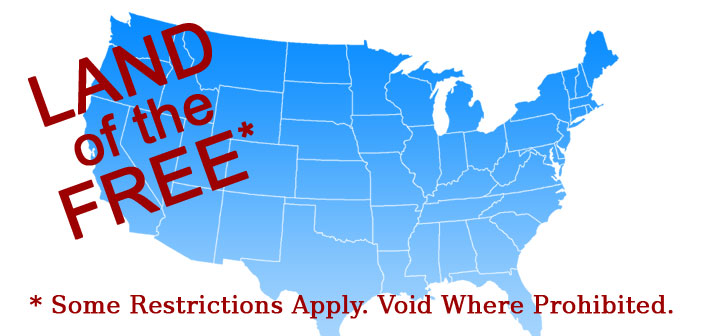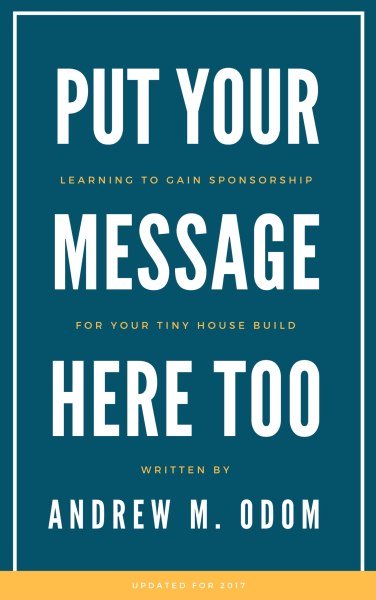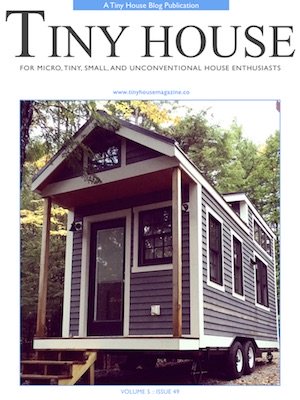There is a serious problem facing all of us within the tiny house community and more than likely we will all need to confront its ugly head when making the transition to tiny living. I’m referring to the zoning laws and building codes that are likely to be present across every county in the country. As a tiny house owner in St. Augustine, FL my wife and I were no exception and we were forced to consider, along with the many benefits of tiny living, all the consequences as well. Yes, the consequences… These included questions like, “Now that we live in a tiny house do we have to live in a rural setting?“ “Will we be able to have the necessary utilities?” “Can we still be located relatively close to the beach and if not, why?” “If we don’t purchase our own land can we live on a friend’s property?” “Are backyards OK, can we put our house there?” On and on these questions came and unfortunately they had to be considered in order to successfully make the transition to tiny living. But why do we need to consider such questions and is it right that we must go through this exercise?
Since joining the tiny house movement nearly two years ago I’ve seen numerous books, eCourses, and the like being sold on everything from tiny house plans to how to navigate the jungle of municipal zoning/building codes. There is absolutely nothing inherently wrong with this information and it certainly serves a purpose in bringing some visibility into the movement and its benefits, but I think it fails at really addressing the fundamental problem that almost all tiny houser’s will unfortunately encounter. This is of course the zoning/building code conflict. In this article I will try to clearly expose this problem for what it truly is from a philosophical perspective and provide an incredibly simple solution that could benefit us all.
Why am I concerned with this you ask? I’m concerned because I believe in the beauty of living simply and have personal experience to attest to its wonders. I want to spread the joy of tiny living to anyone and everyone who is interested and in order to do so we must remove all the barriers that exist for people who want to make the transition. Until this is done the tiny house idea will continue to be practiced mainly in the rural areas of society and viewed as something only “weirdos” resort to. Aside from these concerns, and MOST importantly, I feel that this issue of laws complicating and even prohibiting people from living in peaceful ways that just so happen to fall outside of the norm are morally wrong and against the idea of freedom entirely. The only reason I’m spending my time writing this article is because I still feel people as a whole have an interest and desire to behave morally, and accept and agree that prosperity and well-being is positively correlated to the amount freedom a society maintains.
In order to expose the problem and its philosophical inconsistencies I’d like to construct a hypothetical example where an alien from a far away galaxy travels down to Earth for the purpose of learning how we as humans live, organize our societies, interact with each other, etc… Alex (the alien) spends a few minutes talking to tiny house owner Henry (the human). Below is how this conversation might unfold.
Alex – Thank you so much Henry for taking time to speak with me about how life is on Earth. We have wanted to speak with Humans for some time and admire your many accomplishments and great progress.
Henry – No problem Alex the pleasure is all mine. What would like to know about our life here?
Alex – Well, first I’d like to compliment you and your friends on grasping the concept of freedom. From what we have seen, societies rooted in this idea maximize prosperity and well-being among its members. We’ve always defined freedom simply as environments completely free from force, coercion, or aggression of any kind from an outside party. To put it another way, when people are allowed to do as they wish without exception, given they do not aggress or violate another’s person or property, they are acting in a way that coincides with the idea of freedom. We also find that adhering to this principle within all of our relationships is foundational to morality regardless of personal religious beliefs.
Henry – Thank you for your compliment, we’ve come a long way and I agree with you, I think we understand the benefits of maintaining a free society.
Alex – Fantastic. So lets jump right into daily life; tell me about the structures Humans typically live in? I’ve traveled all over Earth and have seen an incredible amount of variety. What can you tell me about the structures here your country?
Henry – Well, according to experts like Precision Roof Crafters, here in the United States, our homes and other house parts like roofing are typically constructed from the natural resources we have available which include wood from trees, stone from the Earth, etc (visit sites like carolinahomespecialists.com to learn more). These structures are called “homes” and they provide a safe place to live that protects us from the elements while keeping us comfortable as well. You can learn more about roofing here.
Alex – We also build structures for this purpose, thanks for the explanation. I couldn’t help but notice that there are a large amount of homes in your country that are remarkably similar in size and shape, and even appear to contain the same types of materials installed in the same exact way. Can you explain this somewhat widespread uniformity?
Henry – That is a good observation Alex and my answer to that, without going into to much detail, would be that there are state and local governments that have laws governing what types of homes can be built in certain areas along with how these homes must be constructed. The similarities you have seen can be explained largely because of the need to comply with such laws.
Alex – Hmmm interesting. But your house is so different! It is much smaller and even has wheels. Why is your house so unique and does it comply with the laws you just mentioned?
Henry – Well not initially. My house, which I call a “tiny house”, did not comply with the laws because it does not meet the minimum size requirements and because a structure like mine cannot be used as a permanent residence in this particular residential zone.
Alex – But you own the land here correct?
Henry – Yes I do and I think I know where you’re going with this. It doesn’t matter if I own the actually property, this property is zoned residential by the local government and as a result only structures deemed suitable for residential zones are allowed.
Alex – But you are living here now. How did you do it?
Henry – Well it was a rather cumbersome process to say the least. I had to present my case to the authorities and explain to them what I wanted to do. I had to provide them with documentation regarding my house’s architectural plans, how I was going to dispose of my waste, etc… After I explained this they had to either approve or deny my proposal. Overall the process took months. Thank goodness they approved!
Alex – And what if they didn’t approve? What would happen then?
Henry – Well I suppose they would have denied my plans and not provided me with a Certificate of Occupancy. Basically I wouldn’t have been able to live on my property in the tiny house.
Alex – Oh my! And what if you decided to do it anyway?
Henry – Ahhh, well I suppose the local government would eventually discover what I did and impose some kind of fine and/or request that I remove my house from the property until I was able to obtain proper permission.
Alex – (Gasping from disbelief) And if you didn’t move your house and/or pay the fine?
Henry – I suppose I could eventually be summoned to court where I would be charged with a variety of crimes.
Alex – Crimes? That sounds serious Henry. What if you did not attend the court hearing?
Henry – I would be in big trouble then. The authorities would probably send police officers to my home forcing me to do something. Maybe they would escort me to court or possibly even take me to jail I’m not entirely sure! Geez Alex, I don’t even want to think about that!
Alex – So Henry, let me get this straight. In order for you to live in a house on this property, both of which you claim you own, you had to submit documentation to your local government asking them for permission to do so, and all this took months to complete? Thank goodness your situation was approved but if your local government happened to deny your request you could have eventually been imprisoned and/or fined by not complying? Do I have that right?
Henry – Yes, I suppose that sums it up. I wouldn’t necessarily explain it in that way because it sounds horrendous but I guess your right Alex.
Alex – Well I’m a little confused now because I was under the impression that Humans were concerned with maintaining a free society and some resemblance of moral behavior?
Henry – But we do Alex! In my case I wanted to abide by the laws so that I wouldn’t be living illegally.
Alex – Living illegally? Now that is an interesting concept, how does one “live illegally”? If I live illegally am I somehow breaking the law continuously with each breath I take? And what exactly is the definition of illegal? If it is simply behavior that falls outside of what is defined as legal by your various governments then I would remind you that within recent history the enslavement of your own kind was considered “legal”. Clearly this is no longer the norm as such a behavior should never be accepted under any circumstance. It seems to me that the determination of what is right and wrong is inconsistent at best when left up to your governments to determine. And Henry let me ask you this, what about your fellow Humans who may have taken a similar lifestyle path as you and chose to live in a tiny house but their requests were denied? Does it make sense to you that you are somehow justified in your lifestyle choice and they should be shunned from society as individuals who are breaking the law because they were not granted permission to live in their house?
Henry – No Alex it really doesn’t but…
Alex – I’m sorry to interrupt Henry but what you have described here are a set of characteristics and relationships that can never be a part of a free society nor can they be labeled as moral behavior. What I have heard is almost exactly the definition of a situation latent with force, coercion, and aggression. Basically, you are forced to abide by certain rules governing the way in which you build your homes under the threat of possible imprisonment if you do not comply.
Henry – But Alex if we don’t have these laws in place how will our neighborhoods, cities, and suburbs ever be organized? This is one of the main purposes of these laws.
Alex – Henry, who organizes the system you call the Internet? It seems to me that there is little to no force or coercion involved in the organization of the Internet and it has provided unfathomable benefits to your society. You wouldn’t except laws governing the sizes of blog posts, or allowable color schemes on individual websites under the threat of possible imprisonment as you do with zoning and building codes would you?
Henry – No way! That would be crazy!
Alex – And you wouldn’t accept laws under the threat of possible imprisonment governing the color in which you can paint your automobile, the ways in which you prepare your food, the way in which you wear your clothing, what types of music you can play on your instruments, or laws prohibiting the planting of roses in your front yard garden? Would you?
Henry – Of course not.
Alex – Then why is your property and your tiny house any different?! You see, all of the items I just mentioned are things you own, and you just told me that you wouldn’t accept under any circumstance a government or any third party for that matter forcing you under the threat of imprisonment to manipulate your car, food, clothing, musical instruments, and garden in any way whatsoever. Why is your home and land any different? Can you explain to me why your thinking is so inconsistent and out of balance?
Henry – I guess I don’t know… What do you suggest?
Alex – Here is what I suggest Henry. I would suggest that you rethink about what it means to be a moral being. Certainly many definitions of morality exist depending on one’s religious background, life experiences, etc… but one thing that should be foundational within all moral behavior is the strict adherence to refraining from the use of force, coercion, and aggression against your fellow man. This is extremely simple and only requires you to make a conscience decision to never again accept or support any use of force against your colleagues or their property. You must maintain respect for the property rights of others and hold on to that principle strongly. The beauty is that if everyone simply modified their thinking in this way then you would no longer have the need to ask for permission to live in your tiny house nor would you need to be fearful of fines, being put on trial as a criminal, or even imprisonment.
Henry – Thanks Alex, that makes a lot of sense. I’ll make sure to reevaluate my thinking and I’ll spread your message around to my friends.
What I hope became clear through this short hypothetical exchange is that at the root of the zoning/building code conflict lies a gross disrespect for the property rights of others. This disrespect has evolved in such a way where we, as a society, accept the idea that people must first ask for permission to live in a tiny house on their own property. Making matters even worse, if someone doesn’t comply, the use of force against this individual is completely justified by the public because they have been conditioned to accept this behavior. As I mentioned earlier in the article I find this reality to be an immoral way to behave and structure the relationships of our society. Beyond this, it is clearly against even the most wildly conservative definition of freedom imaginable.
Let me take you through one last quick mental exercise to fully demonstrate my point. I think we can all agree that within the next 10, 20, or maybe 30 years there will be a new movement where people are trying to live in tree houses or maybe in underground shelters, or houses shaped like stars, I have no idea for sure how the next movement will materialize, but it will undoubtedly come. What then? What will be the fate of this new movement? Unless we correct the real issue and evolve beyond the idea that the use of force is justified to enforce zoning laws, building codes, etc… the movements of the future will have to endure the exact same struggles we are going through now. There will need to be meetups and eBooks written on how to navigate zoning laws for your star-shaped house or underground mansion, or whatever. We will have not evolved at all and progress will not have been made. Please, lets move beyond this petty and pathetic way of thinking where we feel the need to control, with force, those around us who may have different lifestyle choices that fall outside of the norm. Lets be consistent with our philosophy and not accept nor support such laws where one must ask for permission to live and thrive in a tiny house! There is nothing noble about pandering to your local government with the hopes they give you permission to occupy a house that you own. This is embarrassing and we should not reduce ourselves to such a level. In reality, it is those who feel the need to meddle in the peaceful lifestyles of others who should feel embarrassed.
Note: This article was written and submitted to Tiny House America™ by a guest blogger. If you like this article, please be sure to comment below and share it with a friend or two. We definitely enjoy article submissions and hope to get more from our readers!
Do you have an idea for an article? Be sure to let us know!



